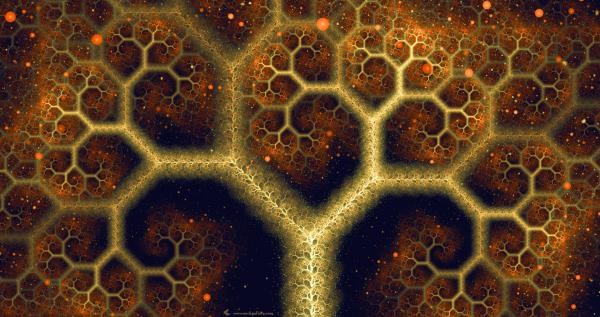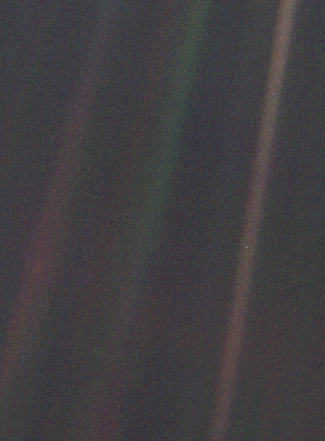Serendip is an independent site partnering with faculty at multiple colleges and universities around the world. Happy exploring!
Week Five (Tues, 2/15): On Beyond Biology
 Sarah Schnellbacher's contribution of an "orange tree" fractal (and explication): "At a certain point fractal patterns become so complicated that the results of the iteration began to look entirely random, but really the results did follow a pattern .... I like to think that I do have a destiny in this sense but it is shaped by my free will in choosing which path to take at each node of a giant fractal pattern that is my life." (plus a caution re: controlling the size of your images!) |
I. coursekeeping:
we got most of your papers: check this page to be sure that yours went where it needs to be (if it didn't, you probably didn't tag it "Evolution and Literature Web Paper 1," and you need to go back and do that now)
you are warmly invited to read your classmates' papers, and to
comment on them (as we will be doing, too, over the next few weeks...)
we are shifting today into the second section of the course:
"Is Evolution a Useful Story Beyond Biology?"
today and Thursday we'll be discussing Part I of Daniel Dennett's book,
Darwin's Dangerous Idea: Evolution and the Meanings of Life
we'll skip over all of Part II, 200 pages "securing the
base camp" of this idea in "Darwinian Thinking in Biology"
for next Tuesday you should read the first part of
Part III, "Mind, Meaning, Mathematics, and Morality":
Chapters 12-14 (pp. 335-427)
II. But before we go "beyond biology," let's troll the forum
for our "last thoughts" about biological evolution
VISUAL diversification continues,
on a variety of different temporal and spatial scales
(thanks to Sarah, elly, kgrass and hannah....)
 |
 |
 |
![]()
from ckosarek, along w/ the question:
Why, if random change is inevitable, have certain
species (seemed to) have avoided it?
per Hope, Erasmus Darwin (Charles' grandfather),
wrote a poem about "The Temple of Nature,
describing a very orderly evolutionary process:
Organic life beneath the shoreless waves
Was born and nurs'd in ocean's pearly caves;
First forms minute, unseen by spheric glass,
Move on the mud, or pierce the watery mass;
These, as successive generations bloom,
New powers acquire and larger limbs assume;
Whence countless groups of vegetation spring,
And breathing realms of fin and feet and wing.
A very orderly poetic form!
...but our central topic this week seemed to involve our
"facing the fact" of the undirected disorderliness of evolution:
Organized Khaos: What really sparked my attention was the discussion on chance and the comfort we share as humans in naming the unexplainable.... Being omniscient would be scary and I in no way strive to be that. I like to think that chance is sprinkled along the plan sketched out for my life, and i'm ok with it. Chance and destiny are twin sisters in my book ... why not?
ems8140: this concept that life does not have a certain path may lead people to be “discomforted by the idea of a random universe" .... This need for control could be considered an evolutionary adaptation. When people experience a tragic or disequilibrating event, it allows them a chance for development.... By assimilating...the event, the person is able to move forward with their lives and increase their ego level.... to believe that things happen for a reason.... I have adopted this type of thinking to help me maintain a sense of control over my life.... Teach students that while the world is ever evolving and advancing, they have the same opportunities for themselves to do so as well....
ewashburn: I've been okay with coming to terms with the effect of randomness on my life. However...I personally think it's an awful thing to teach high school kids... who are simultaneously ego-centric and incredibly insecure; they think the world revolves around them, but simultaneously are on a quest to figure out what their place is in this world. To break the news that maybe, just maybe, nothing happens for a reason and who you are is determined by a random selection of genes, might not be the best idea....By learning about the relationships organisms have with each other, and the complex and incredibly intricate ecosystems that have developed across the world, we establish a little order in the midst of chaos, and make the concept of randomness a little easier for high school students to swallow--at least until they get a little more sure of themselves.
alexandra: the Dennet reading ... really plays into what we have been discussing in class ... what is evolution and what does it mean .... People have to start thinking about their worlds differently, and it is terrifying, rightfully.
kgrass: I think it is the thoughts that scare us most are the most important ones to investigate.... When I was very little, my understanding of the world turned upside-down when my dad and I discussed a globe.... I explained to him that we had to live on the inside of the earth or else we would fall off.... I felt so vulnerable, so worried that I would float into space right then.... Sometimes we assume one story not because it makes sense, but because it gives us the most comfort.
KT: On Tuesday, Professor Grobstein talked about how evolution doesn’t strive to get to a place, it strives to discover new places.... Evolution is packing up the family truckster and just getting on the road... no particular place to go.... the road is the goal. But how can I make sense of all of this without having a frame of reference?... how do I choose a direction? ...maybe our cultures create artificial "rules" so we have a basis for our decisions ... How our culture comes up with its rules despite the overall lack of a goal, I don’t know. Hmmmm.
hannah: Professor Grobstein ... seems to believe that things moved around randomly until they became the way they are now. That feels almost unnatural to hear... because we are pattern seeking creatures... the concept of randomness flatters our intelligence as we discredit nature’s ability to outsmart us.
elly: Are our technological advancements representative of some sort of evolution within our culture...? Is being able to think for ourselves even a good thing? ... don't our conflicting beliefs and thoughts often lead to war and destruction? How can that be a sign of forward progression?
rachelr: Yes the whole idea of consciousness and forward thought troubles me .... we could have just as easily died out instead of evolving to this level of consciousness. What level of randomness accounted for this? How many pieces of the puzzle of biodiversity had to have been fit together so that we could make this change?
... three biology classes this semester...have made me stop to think about all of the millions of small things in our bodies and environments that have to happen correctly (or well enough) in order for us to work. How much trial and error does the randomness of nature and evolution need? I want to hear about the evolutionary changes in species that caused them to fail or to become extinct naturally.
the.believer: In class on Tuesday, we discussed evolution as a process that strives to get to newer places, exploring new possibilities rather than having a goal or aim. Life forms become progressively more complex over time ... can we say that the development and change of life forms over time is guided by entropy as well?
cremisi: I think now i'm starting to see it--the moment where our tightly-focused readings is starting to branch out and pollinate other aspects of life. We spoke about what is perfection... the tango of species to the environment.... So often do we make the fatal flaw of thinking that there is one best way to live life.... But oh so much depends on each person's situation...the time, the space, the place that accounts for the many variations.... Perfection is always relative.
We seem to be ready for Dennett!
So: let's go "on beyond biology," branching
out and pollinating other aspects of life...

from kgrass: photo taken by Voyager 1 in 1990, w/ Carl Sagan's commentary: ""Look at the pale blue dot. That's here. That's home.
That's us."
So, Paul: lead us out there/in here?
... on beyond biology?


